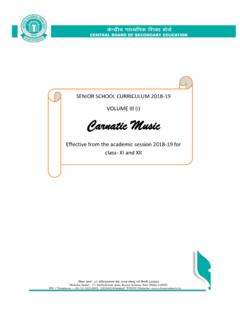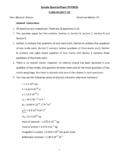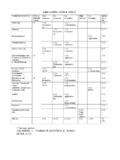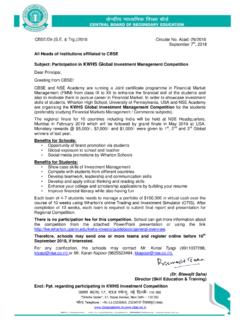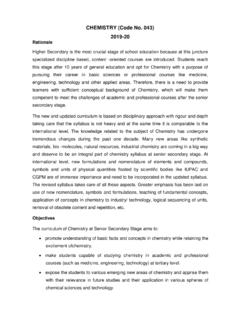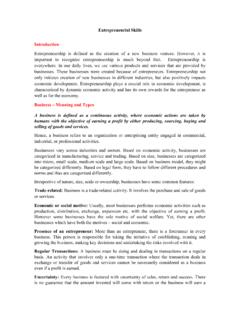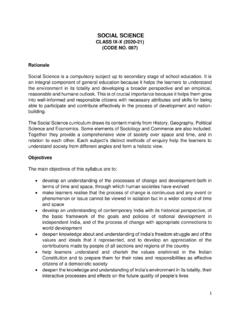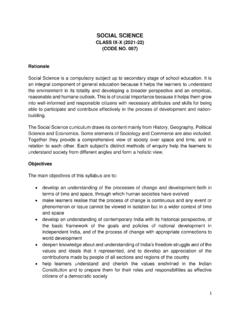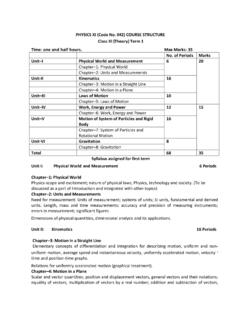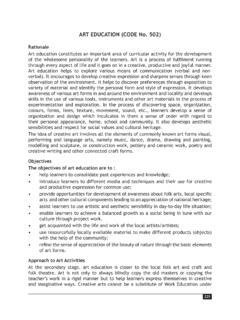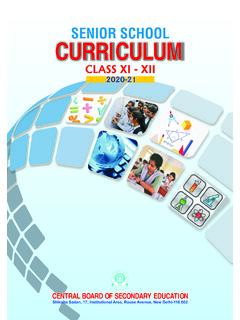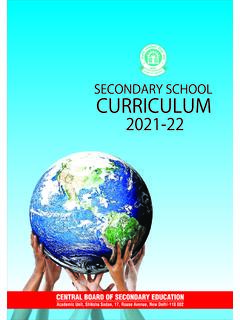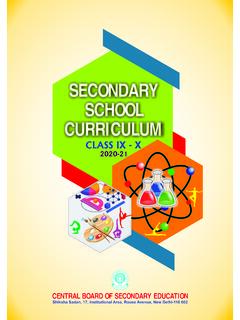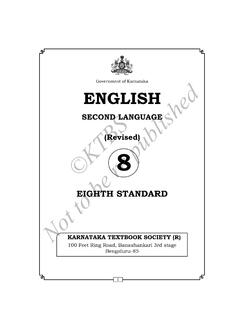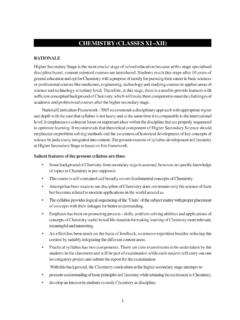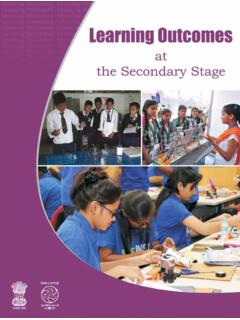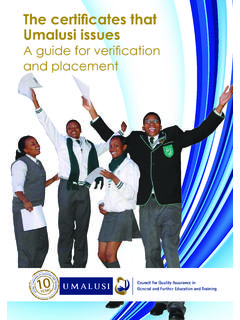Transcription of cbseacademic.nic.in
1 11. PRINCIPLES OF THE CBSE curriculum The curriculum refers to the lessons and educational content to be taught to a learner in a school. In empirical terms, it may be regarded as the sum total of a planned set of educational experiences provided to a learner by a school. It encompasses general objectives of learning, competencies to be attained, courses of study, subject-wise learning outcomes and content, pedagogical practices and assessment guidelines. The curriculum provided by CBSE is based on national curriculum framework - 2005 and seeks to provide opportunities for students to achieve excellence in salient features of the CBSE Senior Secondary School curriculum The curriculum prescribed by CBSE strives to:1.
2 Provide ample scope for holistic physical, Intellectual and social development of students;2. emphasize constructivist rather than rote learning by highlighting the importance of hands-on experience;3. enlist general and specific teaching and assessment objectives to make learning competency based; 4. encourage the application of knowledge and skills in real life problem solving scenarios;5. uphold the Constitutional Values by encouraging values-based learning activities;6. promote Critical and Creative Thinking aligned to the 21st Century Skills in classrooms;7.
3 Integrate innovations in pedagogy such as experiential learning, Sport & Art-Integrated Learning ,toy-based pedagogy, storytelling, gamification etc. with technological innovations (ICT integration) to keep pace with the global trends in various disciplines;28. promote inclusive practices as an overriding consideration in all educational activities; 9. enhance and support learning by different types of assessments; and10. integrate environmental education in various disciplines from classes I- Objectives of the curriculum 1.
4 Achieve desired national level of competencies in cognitive, affective and psychomotor domains;2. facilitate acquisition of 21st Century Skills and enhance self and social awareness through thematic or multidisciplinary approach;3. promote Cooperative Learning, Collaborative Learning, Self-directed learning etc. to facilitate realization of learning outcomes;4. promote Authentic Assessments based on real world tasks involving meaningful application of knowledge and skills;5. promote Life Skills , inculcate values , foster cultural learning and international understanding in an interdependent society;6.
5 Acquire the ability to utilize technology and information for the betterment of humankind;7. strengthen knowledge and attitude related to livelihood skills and promote lifelong learning;8. develop the ability to appreciate art and showcase talents;9. promote physical fitness, health and curriculum Areas at Senior Secondary Level For the purpose of fostering competences in learners, the curriculum encompasses seven major learning areas, which are: Languages, Humanities, Mathematics, Sciences, Skill Subjects, General Studies and Health and Physical Education.
6 These areas are broadly divided into electives and compulsory areas as detailed below:-3 LanguagesElectivesElectivesSkill ElectivesGeneral StudiesHealth & Physical Education *Work ExperienceCompulsory*Work experience is subsumed in Health and Physical Elective Areas:(i) Languages include Hindi, English and other 30 languages. The curricula in languages focus on listening, speaking, reading and writing skills for developing effective communicative proficiency. Learners use language to comprehend, acquire and communicate ideas.
7 (ii) Humanities and Social Sciences- Geography, History, Economics, Home Science, Sociology, Fine Arts, Political Science, and related subjects promote the learning of history and culture, geographical environment, global institutions, constitutional values and norms, politics, economy, interpersonal and societal interactions, civic responsibilities and the interplay of all these. Learners appreciate and value every human s right to feel respected and safe, and, in this regard, also understand their Fundamental Rights and Duties and behave responsibly.
8 Learners learn to be tolerant and empathetic towards others through the study of these subjects.(iii) Sciences: Biology, Chemistry, Physics, Computer Science, and Informatics Practices help in making students perceptive about matter and energy, nature, the environment, technological breakthroughs in science. The focus is on knowledge and skills to develop a scientific attitude and to use and apply such knowledge for improving the quality of life. The curriculum promotes the ability to engage with science-related issues, and with the ideas of science, as a reflective citizen by being able to explain phenomena scientifically, evaluate and design 4scientific enquiry, and interpret data and evidence scientifically.
9 Students understand the importance of to apply scientific knowledge in the context of real-life situations and gain competencies that enable them to participate effectively and productively in life.(iv) Mathematics includes acquiring the concepts related to numbers, operations, computation, measurement, geometry, probability and statistics, the skill to calculate and organize and the ability to apply this knowledge and acquired skills in their daily life. It also includes understanding of the principles of reasoning and problem solving.
10 Learners identify, integrate and apply numerical and spatial concepts and techniques. They have clarity of concepts and are able to connect them to the real world. Learners rationalize and reason about pre-defined arrangements, norms and relationships in order to comprehend, decode, validate and develop relevant patterns.(v) Business and commerce based electives- Business Studies, Accountancy, Entrepreneurship, Economics and related subjects help in gaining understanding about core business disciplines.
